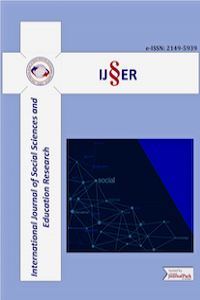Education and knowledge are fundamental to social justice and economic growth
This paper tries to explain that both knowledge and education are the way to increase economic growth and social justice. We have used the panel data to check the relationships between four indicators: knowledge, education, economic growth, and social justice. These data are from the Social Progress Imperative Organization (2018). We have used the statistic method (mode, quartile, and decile) to analyze our data though they are not enough. So, we found that 54 countries in the world have the lowest revenue between $600 and $9,300. They set forth almost 43% among 126 countries. In this modal class, about 6% have the lowest rate SPI (Social Progress Index) in the world - it is between 20 and 40-, and more than 94% have a rate SPI between 40 and 80. The results of the OLS regressions show that the improvement of social progress can increase GDP per capita to seven times what it was. On the other hand, both improvements in knowledge and education can increase GDP per capita to thirteen times what it was.
Keywords:
Knowledge, Education, Economic Growth Social Justice,
___
- Davood Salmani, “Impacts of social justice perception on Elite Migration“, Iranion journal of reanagement studies, vol – 4 , No.1 ( tahran : 2011) , p.1.
- El Alaoui, A. (2016). "Impact of Women’s Education on the Economic Growth: An Empirical Analysis Applied to Morocco, Algeria, Tunisia, and Egypt". International Journal of Social Sciences and Education Research, 2(3), 1187-1210.
- Jandhyala B. G. Tilak., (1989). "Education and its relation to economic growth, poverty, and income distribution: past evidence and further analysis". World Bank discussion papers; no. WDP 46. Washington, DC: The World Bank. http://documents.worldbank.org/curated/en /357751468739481512/Education-and-its-relation-to-economic-growth-poverty-and-income-distribution-past-evidence-and-further-analysis
- Kelso, O. & Adler, M., (1958). The capitalist manifesto. New York: Random House. 279 pages http://www.kelsoinstitute.org/pdf/cm-entire.pdf
- Hayek, F. A. (1976). The mirage of social justice. Chicago: The University of Chicago Press.
- Mead, L. (1986). Beyond entitlement: The social obligations of citizenship. New York: The Free Press.
- Mill. J. S. (1971). Utilitarianism. Indianapolis, IN: Bobbs-Merrill. Moyes,
- Patrick (2011). “Utilitarianism or Welfarism: Does it Make a Difference?”. Cahiers du GREThA (Groupe de Recherche en Economie Théorique et Appliquée), n° 2011-30.
- Nozick, R. (1974). Anarchy, state, and utopia. New York: Basic Books.Sen, A. (1990, June 14). Individual freedom as a social commitment. New York Review of Books, 49–54.
- Sen A. (2003), "Development as Capability Expansion". In: Fukuda-Parr S, et al Readings in Human Development. New Delhi and New York: Oxford University Press.
- Srivastava,A.K. and Sharma, S., (2017). "Social Justice Through Aadhaar: An e-Policy Initiative", Chapter 5 of book Technology, Society and Sustainability: Selected Concepts, Issues and Cases edited by Lech W. Zacher. pp.83-98.
- Sunstein, C. R. (1997). Free markets and social justice. New York: Oxford University Press.
- UNESCO, (2012), "Education and skills for inclusive and sustainable development beyond 2015", Thematic Think Piece. Pp.1-16
- UNESCO, (2014). "TEACHING AND LEARNING: Achieving quality for all", Education for All Global Monitoring Report, 201 3/4, 496 pages. ISBN 978-92-3-104255-3. www.unesco.org/publishing
- Reisch, M. (2002). “Defining social justice in a socially unjust world”, Families in Society, 83(4), pp. 343-354.
- Zajda, Joseph (2010). Globalization, Education and Social Justice. Globalisation, Comparative Education and Policy Research 10. Ed. Springer.
- Yayın Aralığı: Yılda 4 Sayı
- Başlangıç: 2015
- Yayıncı: Mahmut DEMİR
Sayıdaki Diğer Makaleler
Veli toplantılarının öğrencilerin akademik başarılarına etkisi
Hemşirelik öğrencilerinin yabancı dil olarak İngilizceye ilişkin algıları: Bir metafor çalışması
Gamze TESKERECİ, Adem SÜMEN, Sema Nur ÇİÇEK, Ayla Nur ÖZERLİ
Meltem EROL DÜBASTILAR, Zafer Ali YILDIRIM
